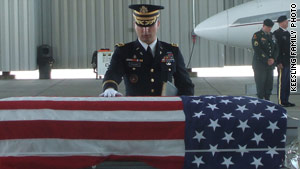A few weeks ago, various news outlets reported the story of Spc. Chancellor Keesling, an American soldier in Iraq who committed suicide. While incidents of suicide among soldiers who are currently active and those returned home is certainly newsworthy, the focus of this particular story was quite different. Although Mr. Keesling received a proper military burial, his family did not receive the standard condolence letter sent by the president, as is customary for fallen soldiers.
This didn’t sit well with the family. Was he not a hero too? Did he not serve his country honorably? Mr. Keesling’s family then found out the reality: there would be no condolence letter — it was a matter of policy. Incensed, Mr. Keesling’s father, Gregg, wrote letters to President Obama and Army Chief of Staff Gen. George W. Casey Jr. asking them to reconsider the policy. You can read the letter here.
An Op-Ed piece in Friday’s New York Times also addresses the issue, which looks at the notion that recognition of soldier suicide valorizes or venerates death.
I have mixed feelings on this issue. I can certainly see how a grieving family would want to have their son or daughter’s military service recognized and respected and how a letter from the president would help ease that pain just a bit. However, I also don’t think killing oneself is the same as dying in combat, getting killed by friendly fire or any other way while serving. It is a different kind of death — or so we are to believe — one that does not jibe with the heroic propaganda and selfless ideology of the military.
This does not mean that Mr. Keesling did not serve his country honorably or that he doesn’t deserve recognition somehow. But ultimately, it is Mr. Keesling’s family that will live with the pain of his death for the rest of their lives, and no letter is going to change that. For President Obama and other military officials, a condolence letter is just part and parcel of the war machine, or S.O.P (standard operating procedure) in military terms. Although the Administration is looking into their current policies surrounding condolence letters, suicide, for now, is not considered “honorable.”
I believe that focusing on the root causes of depression and supporting mental health efforts for military personnel is the best strategy — and will hopefully help lessen the number of suicides in the first place — and the pain for those left behind.

4 replies on “No Presidential Condolence for Soldier Suicide”
Wait a minute, it’s not as if the majority of post-combat suicides are not combat related.
Thanks for the comment B-man.
Well certainly, you can argue that those post-service suicides are combat-related–and even combat-induced. But, taking your own physical life–as opposed to someone else taking it away from you–is different. The psychological scarring incurred by soldiers is certainly very real and is at the root of their suicidal behaviors. But I guess I see it as more collateral damage than anything else–not precisely the same as dying “in combat.” I have the utmost sympathy for the families left behind in this situation, but I think it’s a slippery slope to consider the mode of death the same. One is not “honorable” and the other “cowardly”, but they are different in my opinion.
But this begs the real issue we should be taking about–not when and who should receive a letter from the president. These letters are somehow supposed to show sympathy to the grieving families and to uphold the notion that their son or daughter “died for a good and just cause.” And I call bullshit on that. Yeah, for those families that want a bit of comfort and to believe that their child did not die in vain, it may soothe. But really, these condolence letters attempt to shove under the rug the real and ugly business of war.
Until such time as there is no more war, which shall be a very long wait, it’s my hope that the returning (and currently serving) soldiers and their families have access to the mental health resources they need in order to alleviate the “collateral damage” of war.
I agree about the ultimately ideological function of the letters, but I still think that acknowledging the suicide (not to mention domestic violence) which occurs after combat would help show just how serious it is to send these, mostly poor, people to fight ideological wars.
I’m just happy to see Obama put on the spot. That guy’s neo-liberal policies need to be pointed out, especially to liberals.
Agreed. Obama needs to be put on the spot for many things, not the least of which is the war.